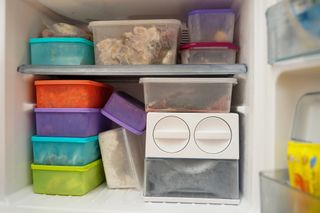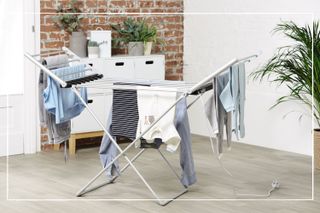How to save money: 26 expert tips for food, bills, travel and family
Understanding how to save money is key to limiting the impact of rising costs as much as possible


It’s never been more important to know how to save money as the cost of living crisis continues to eat into family finances. Right now especially, households are scrambling to figure out how to make extra money to help make ends meet.
Personal finance analyst Alice Haine from Bestinvest says: “For many families, the cost-of-living crisis has made saving seem more of a luxury rather than a necessity. While everyone would love to stash cash away for the future – being able to afford to is an issue in itself as households contend with runaway food, fuel and energy bills.
"But by slashing the amount you spend on everyday bills and cutting costs elsewhere, you can quickly create a small sum that will either boost your current account or be saved or invested into a separate pot for a rainy day”.
2022 was a year of rising prices, with everything from energy and National Insurance to food and fuel going up significantly. And 2023 could see more price increases. All of these rising costs eat into our ability to save money. In fact, according to the Resolution Foundation, only one in four of us has enough money to pay our bills for just one month if we lost our jobs.
The best place to start to save money is to budget. You can choose one of the best budgeting apps if you're not sure where to start. Once you understand your budget, you can start looking at areas where you need to cut back or any unnecessary spending that you can curb.
1. Swap takeaways for fakeaways
Takeaways are all too tempting for tired and busy parents, but they are much more expensive than cooking food at home.
If you have a weekly takeaway treat, try to reduce it to once a month instead as a way to save money. You could always try making a homemade takeaway whenever you get a craving for your favourite fast food.
GoodtoKnow Newsletter
Parenting advice, hot topics, best buys and family finance tips delivered straight to your inbox.
2. Shop wisely
Whether you are shopping online or in a shop or supermarket, keep in mind that a retailer is always trying its best to make you buy things - and the more things the better. It might be that it displays more expensive items at eye level with cheaper items lower down, or sends you regular emails with multibuy or money-off offers. (We reveal the sneaky supermarket tricks to look out for!)
Goodto.com’s Money Editor Sarah Handley says: “If you’re looking to save money, you need to be savvy about all of the moves that retailers make to encourage you to buy things you don’t necessarily need.
“To avoid temptation, unsubscribe to the emails, turn off app notifications and plan purchases ahead of time and budget for them rather than buying on impulse.”
3. Try a different supermarket
Switching to a different supermarket can be a great way to save money on your food shopping, especially when you consider the price difference between the most expensive and cheapest supermarket.
Buying online if possible is a great option. It’ll help you avoid impulse buys, and you can check your fridge, freezer and cupboards as you are adding items to your basket to avoid buying items you don’t need.
But if you do buy online, try to choose the collection option rather than delivery to keep costs low. If you do need your shopping to be delivered, try to be flexible on the day and time you want it delivered to get the cheapest delivery price.

4. Remember your loyalty card - and your bags
If you’re shopping somewhere with a loyalty scheme, make sure you flash your supermarket loyalty card. In some cases, you’ll get exclusive discounts or coupons, and in others you’ll be able to exchange loyalty points for things like restaurant vouchers, theme-park and cinema tickets and more.
Also remember to take your own bags with you - you can pay anywhere from 10p to 50p for a reusable bag from your local supermarket which can soon tot up if you are doing a big shop.
5. Use coupons and voucher codes
If you do have items you want to buy, look out for discounts by searching voucher codes websites, such as our sister brand MyVoucherCodes, or checking magazines and fliers.
Sign up for newsletters from your favourite retailers, or follow them on Twitter or Facebook, for more codes, deals and discounts (but remember, you might want to unfollow or unsubscribe after you have bought what you need to avoid temptation down the line). Then avoid pesky postage costs by waiting until you have a big enough order to qualify for free shipping, or by using click and collect services.
7. Try to reduce leftovers
We throw away a whopping £700 of food per household each year but there’s lots of ways to reduce food waste..
This might be:
- Using every part of the fruit and vegetables that you buy
- Making your own stocks and sauces
- Freezing leftovers
- Having a ‘use up’ day once a week.

You can always try using your freezer more to increase the shelf life of your shop. You can try this cheese hack if you're wondering whether you can freeze cheese, or even try freezing avocado or cooked pasta.
7. Buy a brand level lower
If you normally buy branded products, like Walkers, Kelloggs or Coca Cola, try buying supermarket own brands instead. If you already buy supermarket own brands, then try out the value or basics range to see if you can tell the difference.
To test the waters, try it with the following items:
- Rice and pasta
- Over the counter medications, such as paracetamol or hay fever tablets
- Hand soap and shower gel
- Canned foods like beans and chopped tomatoes
- Cereals
- Nappies
- Baby wipes
- Washing up liquid
- Laundry detergent.
Even if you end up going back to old favourites for some items, if you stick to the new brand level for certain products, you’ll save some money.
8. Don't leave appliances on standby
Many of us tend to think of an appliance on standby as being off. But when you look at it in terms of energy consumption, ‘standby’ and ‘off’ are two very different things. Some appliances can even use as much energy while on standby as they do when they are on, which means you could be wasting money unnecessarily.
Another way to reduce your energy use is to use a smart plug. This will allow you to control you appliances and devices from your smartphone, and turn them off remotely.
9. Only boil the water you need
Did you know that it could cost you around £40 more per year to boil a full kettle each time you made a hot drink, compared to just boiling enough water for one cup? And that’s based on just two hot drink making sessions a day, so could be significantly more if you are a tea-drinking fiend. Our guide to how much it costs to boil a kettle explains how you can keep costs as low as possible.
10. Be mindful when using ‘wet’ appliances
Wet appliances like your washing machine and dishwasher tend to need to be some of the most energy hungry appliances. But there are ways you can be more efficient about how you use them.
Eco modes might take a little bit longer than standard cycles in washing machines and dishwashers, but they are great for keeping running costs low. Eco modes tend to use less and cooler water than other cycles, but run longer to achieve the same standard of cleanliness.
If you want to avoid using a dishwasher, then check out this viral washing up hack that could save you money every time you do the dishes!
11. Do you really need to use a tumble dryer?
As well as wet appliances, like washing machines and dishwashers, tumble dryers are energy-guzzling appliances, so it makes sense to use this particular appliance less, where you can. If you’re looking for how to dry clothes without a dryer, you might choose to dry your clothes outside on dry days, or dry them on an airer or on radiators indoors. We've ranked the cheapest way to dry clothes to help.
If you need to dry clothes quicker, it could be worth investing in a heated airer or a dehumidifier which both cost less to run than a tumble dryer.

Using a heated clothes dryer is a cheaper alternative to using a tumble dryer
12. Switch to an air fryer
If you regularly use your oven to make dinner for your family, then it might be worth considering an air fryer instead. When it comes to how much an air fryer costs to run, it’s pretty similar to a microwave, but significantly cheaper than a conventional oven. This could make a serious difference to your annual energy bills.
If you don’t already own one, you can pick one up for as little as around £30.
13. Turn the thermostat down
According to the Energy Saving Trust, you can save around £80 a year by turning your thermostat down by just one degree - and it’s likely you won’t even notice a difference in your comfort levels.
You could also look at how many hours a day you have the heating on, and see if you can reduce that number to help save money.
14. Bleed your radiators
Bleeding your radiators can help your heating system work more efficiently, improving how effectively your home is heated. This means you might be able to have your heating on less which can save you money.
It’s an easy task to complete yourself. You just need a towel, a bowl to catch any drips and a radiator key.
15. Get a smart meter for free
If you don’t have a smart meter, it’s worthwhile seeing if you can get one for free. They will help you understand how much energy you are using which is an essential first step in figuring out how to save energy in your home.
16. Check how you pay your bills
In many cases, how you pay your bills can influence how much you pay. For example, if you pay for your energy by cheque, you could be paying £215 more per year compared to those with similar usage who pay by direct debit.
This could also be the case for things like car insurance and if you have an Amazon Prime membership. Amazon Prime’s monthly membership costs £8.99, while the annual membership costs £95. But 12 monthly payments of £8.99 will actually cost you £107.88 over the course of the year - almost £13 more than the annual membership fee.
But make sure you don’t commit to paying big bills in one go if it is likely to put you in debt or make you unable to pay other bills.
22. Do you qualify for any council tax discounts?
Council tax is one of those priority bills that you must pay, however there’s still ways to save. Check what qualifies for council tax reduction and whether your circumstances mean you are eligible. It’s also worth checking whether you may be due a refund if you’ve overpaid, especially if you’ve moved home.
It’s also worth checking your council tax band if you live in the same size property as your neighbours and find they pay less. Refunds can be huge if you have lived there a long time as you can claim back as far as 1993 when council tax first came in, or when you first moved in, if this is more recent.
18. Save on fuel costs
The price of petrol and diesel is soaring but there’s lots of ways to save money on fuel, including keeping your tyres inflated, driving sensibly and not driving around with unnecessary cargo. Car sharing where you can and avoiding unnecessary short journeys can also help you to use less fuel.
It’s also worth using this fuel prices tool from Go.Compare to find the cheapest fuel near you. Not only is it free to use and there is no need to register, you can also specify the fuel type.

19. Save on train travel
With rising pump prices – filling up the car is a luxury so you could save money taking the train instead of driving. Plus you’ll save on car parking too!
If you’re after cheap train tickets, book in advance and see if you can save by split ticketing, where it can cost less to buy one or more tickets to cover a single journey on the same train.
20. Book early and in advance for any activities
Keeping the kids occupied can gouge a big chunk out of the family budget especially in the school holidays.
Save money by booking big trips to the likes of zoos and theme parks online rather than rocking up on the day, or see if you can cash in supermarket loyalty points. You could also keep your eyes peeled for free adult ticket promotions that regular appear on Kelloggs cereal boxes.
21. Do you need a TV licence?
If you exclusively use streaming services to watch boxed-sets or films on demand, but are still paying for a TV licence, you may be wasting money. You need a TV licence if you watch or record live TV, on any channel or streaming service. But if you only watch programmes on demand (with the exception of BBC iPlayer), you don’t actually need a TV licence so could save yourself between £159 and £164 per year (depending on how you pay).
22. See if you can change from a prepayment meter to a standard meter
If you have a prepayment energy meter, you are likely paying more for your gas and electricity than those on standard meters, which is definitely not fun at a time when energy bills are so high.
In fact, according to Uswitch, the number of prepayment meter installations have risen for the first time since 2019, with 60,000 prepayment meters installed between October 2021 and March 2022. This means that more people could be at risk of self-disconnection this winter.
If you can't switch, try these prepayment energy meter tricks to see if you can reduce how much you pay.
23. Buy second hand
Whether it’s clothes, homewares or refurbished tech like phones for laptops - buying second hand is a brilliant way to spend less and save money. Local charity shops are a good choice, but you can also check out apps like Vinted, Depop and Preloved, as well as eBay and Facebook Marketplace.
You can get in on the action and sell your unwanted items online too. Read our guides to how to sell clothes online and how to sell your old gadgets for clear tips to see you through the process.
24. Make food from scratch and pack lunches
Food prices have risen dramatically this year, so if you want to save money, there might be some easy changes you can make to cut your costs. Making lunches from scratch is key, as well as avoiding buying any pre-prepared sandwiches, fruit or vegetables which are expensive.
Making packed lunches for work, school and says out, will also help to keep costs low. It could also be worth looking into whether your child qualifies for free school meals to reduce your costs even more.

25. Buy in bulk or extra value sizes
Buying extra value sizes (or buying in bulk) can be a great way to save money on household and food items, like toilet roll, surface cleaner, washing tabs, crisps and cereal. But it’ll only prove to be a bargain if you use up everything you buy.
Avoid bulk buying a product you’ve never used before, even if it’s a good deal, because if you don’t like it, you're either lumbered with having to use up a product you hate, or you’ll end up buying an alternative.
26. Cut your childcare costs
Pay for child care while you work? See if you're eligible for 30 hours free childcare or claim some cash back from combination of Working Tax Credits, or the new tax-free childcare scheme that pays out up to £2,000 per child. Different options suit different people, but it’s worth wading through the Government website Childcare Choices to find what works for you.
Sue Hayward is a personal finance and consumer journalist, broadcaster and author who regularly chats on TV and Radio on ways to get more power for your pound. Sue’s written for a wide range of publications including the Guardian, i Paper, Good Housekeeping, Lovemoney and My Weekly.

Sarah is GoodtoKnow’s Consumer Writer & Money Editor and is passionate about helping mums save money wherever they can - whether that's spending wisely on toys and kidswear or keeping on top of the latest news around childcare costs, child benefit, the motherhood penalty. A writer, journalist and editor with more than 15 years' experience, Sarah is all about the latest toy trends and is always on the look out for toys for her nephew or Goddaughters so that she remains one of their favourite grown ups. When not writing about money or best buys, Sarah can be found hanging out with her rockstar dog Pepsi, getting opinionated about a movie or learning British Sign Language.
-
 New research has linked video games to teen psychosis - here's what parents need to know
New research has linked video games to teen psychosis - here's what parents need to knowTeenagers who spend a lot of time playing video games are more likely to have a psychotic experience, according to a new study.
By Ellie Hutchings Published
-
 You might want to hold your tongue when watching your kids play sports - new study reveals the massive impact a parent’s sideline behaviour can have on children
You might want to hold your tongue when watching your kids play sports - new study reveals the massive impact a parent’s sideline behaviour can have on childrenWhen you're shouting from the sidelines, the words you say can hugely affect your child's approach to sport
By Charlie Elizabeth Culverhouse Published
-
 'It isn’t a holiday – it is crucial bonding time' - 70% of dads can't afford to take two weeks paternity leave, according to new research
'It isn’t a holiday – it is crucial bonding time' - 70% of dads can't afford to take two weeks paternity leave, according to new researchThe research also found that only 14 per cent of fathers were ready to return to work mentally after taking their paternity leave
By Sarah Handley Published
-
 Two-child benefit cap 'pushes children into poverty' - campaigners urge government to scrap 'cruel policy' that impacts 1 in every 10 children
Two-child benefit cap 'pushes children into poverty' - campaigners urge government to scrap 'cruel policy' that impacts 1 in every 10 childrenThe controversial two-child benefit cap has met with strong opposition since its introduction in 2017
By Sarah Handley Published
-
 Gen-Z could be costing their parents £1,300 a year, by refusing to do this one thing (but it's not always their choice)
Gen-Z could be costing their parents £1,300 a year, by refusing to do this one thing (but it's not always their choice)It's not just parents who are facing the additional costs, the costs for Gen Z could be even higher
By Sarah Handley Published
-
 More than half of parents want to do this important thing for their kid's education but can’t afford to, according to new research
More than half of parents want to do this important thing for their kid's education but can’t afford to, according to new researchPressures on the family budget are preventing parents from paying for educational support outside of school
By Sarah Handley Published
-
 75% of mums feel guilty buying things if they earn less than their partners, according to social media poll, and the comments section was part heartbreaking, part inspiring
75% of mums feel guilty buying things if they earn less than their partners, according to social media poll, and the comments section was part heartbreaking, part inspiringSome mothers felt guilty for spending their partners money, while others saw it as household money instead
By Sarah Handley Published
-
 10 best zoos in the UK based on ticket prices, reviews and value for money
10 best zoos in the UK based on ticket prices, reviews and value for moneyThe best zoos in the UK have been determined based on a number of key factors, include prices, popularity, Trip Advisor ratings and how many animals they have
By Sarah Handley Published
-
 Child benefit is finally going to be made fairer - here's what's changing and when
Child benefit is finally going to be made fairer - here's what's changing and whenChild benefit is finally going to be made fairer - here's what's changing and when
By Sarah Handley Published
-
 Mum-of-three Helen Skelton shares 5 free and easy ways to keep kids entertained in the Easter holidays (and they all involve one thing)
Mum-of-three Helen Skelton shares 5 free and easy ways to keep kids entertained in the Easter holidays (and they all involve one thing)Presenter Helen Skelton has revealed how parents can keep costs low when keeping the kids occupied during school holidays
By Sarah Handley Published